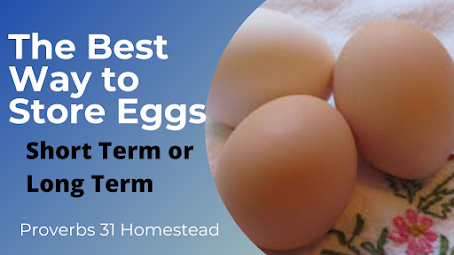This post may contain affiliate links. All opinions are my own. Please see FCC disclosure for full information. Thank you for supporting this site!
In the past year or so, I've seen a lot of people experimenting with the best way to store eggs - short term and long term. I've also seen a lot of egg-preserving failures. So before you try that egg storing method you've seen people talking about on social media, check out this post. I've been storing eggs for many years and have a very good idea of what works - and what doesn't!
Scroll down to watch the video, or read the recap below.
3 Things to Know Before Storing Eggs
Whether we're talking chicken, duck, goose, turkey, quail, or some other type of edible bird egg, there are three important things to know before you store or preserve them.
#1. All bird eggs have a natural coating called a "bloom." This bloom prevents bacteria from entering the egg, protecting the embryo inside. It also keeps the egg fresher. Therefore, it's unwise to wash eggs that you want to store for any length of time. Washed eggs simply don't last as long and are more likely to develop bacteria that can make you ill.
This is even true with eggs that have barnyard soiling. It's better to store dirty eggs unwashed; washing opens up the eggs to bacteria. (Don't worry; unwashed eggs in your fridge do not contaminate other food, if stored in their own container.)
By the way, all store-bought eggs sold in the U.S. are washed in bleach. This makes them unsuitable for many forms of preservation. If you buy eggs from the farmer's market or from a friend who raises birds, be sure to ask if the eggs are washed or not.
#2. The rounded end of an egg contains a sack of air. If you store eggs rounded end down, the air travels upward to the yolk, making the egg go bad faster. Always store eggs pointy end down.
#3. Eggs that are cracked or chipped should not be stored. Throw them away, or feed them immediately to your dog or chickens. (Remove the shells first.) Any breaks in the shell allow bacteria to enter.
How I Store Most of My Eggs
I prefer to store our eggs in ordinary cardboard egg cartons. 18 count suits us best. (12 count cartons fill up too fast and larger sizes are cumbersome, in my experience.) I reuse these upcycled cartons over and over again and when they finally start breaking down, I compost them. You can also buy plastic cartons - including some that hold a great many eggs. Either type of carton is fine.
I keep one carton in a lone location in my fridge. When I gather eggs, I immediately pull out that carton and put the eggs in it. When the carton gets full, I transfer it to a separate area of my fridge, putting it on the bottom of a stack of cartons. When I'm ready to cook, I simply grab the carton on top of the stack, knowing I'm using the oldest eggs first.
You can also store unwashed eggs on the counter; I just prefer not to because they don't last nearly as long that way.
How I Store Eggs Long Term
The great news is, I don't have to do anything special to make these refrigerated eggs last a long time. Unwashed, stored in the fridge, they last 6 months to a year.
Now you may be thinking, "Yes, but then the fridge is full of eggs." And that can happen. If you choose this method, you get to decide when enough is enough and either sell some eggs or preserve them some other way. I have a small, old fashioned fridge and this method still works for me. Ideally, though, I'd have a separate refrigerator that I could store eggs in. Used is fine - even a dorm-sized fridge works - and it can go in the garage or some other outbuilding.
And if the power goes out? No problem! Those eggs will still last just fine until the power comes back on.
Other Long Term Egg Storage Ideas
I have tried a number of methods for storing eggs long term. Other than refrigeration, the two best methods are, in my opinion, freezing and freeze-drying. But if you're off-grid, or just want to know more about various methods of storing eggs for longer than a year, check out the post below for details.
How Do I Know if Stored Eggs are Safe to Eat?
If you've stored eggs for a while (or if your hens have hidden their eggs and when you discover them you have no idea how old they are), it's easy to learn if they are still safe to eat. Just do a float test. You'll find complete egg float test instructions here.
Related Posts















No comments